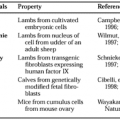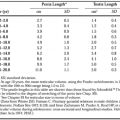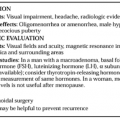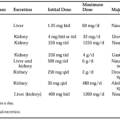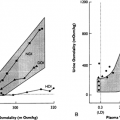VASOPRESSIN DYSREGULATION
Part of “CHAPTER 17 – HYPOPITUITARISM“
Vasopressin (i.e., ADH) is synthesized in the magnocellular neurons of the anterior hypothalamus and transported and stored in the posterior pituitary gland. Vasopressin is secreted into the peripheral circulation and acts on the renal tubular cells to prevent free water loss. Serum osmolarity—and, to a lesser extent, volume status—regulate posterior pituitary vasopressin secretion. Deficiency of vasopressin may lead to polyuria, polydipsia, and free water loss with resultant hypernatremia. This condition is known as central diabetes insipidus (central DI) and can be temporary or permanent. It is common to lose several liters of water daily. Central DI usually indicates damage to the hypothalamus, either via suprasellar extension of a sellar or brain mass, trauma, or after extensive surgical resection. Appropriate secretion of vasopressin can often be seen with posterior pituitary damage if the hypothalamus remains intact. A patient who is alert, able to sense thirst, and can get to unlimited free water usually can drink enough to keep pace with free water losses. Of course, these patients need exogenous vasopressin treatment. However, a patient with DI and an altered sensorium or who is not able to get to free water is in a life-threatening situation; free water replacement and exogenous vasopressin treatment are urgently required. DI has other nonpituitary causes (see Chap. 25 and Chap. 206).
Stay updated, free articles. Join our Telegram channel

Full access? Get Clinical Tree


